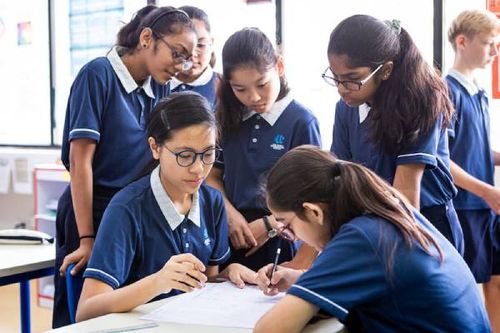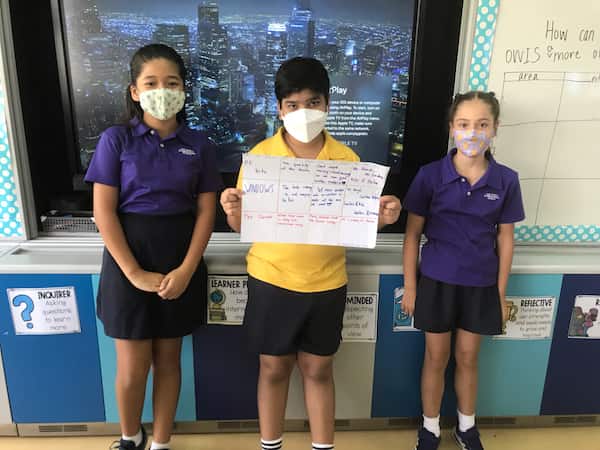A secondary school curriculum could include preparation for the International General Certificate of Secondary Education (IGCSE), the General Certificate of Secondary Education (GCSE), the Cambridge O-level exams or other equivalent qualifications. Compare the different educational and future benefits each programme offers as you choose the best secondary school for your child.
What is the IGCSE?
The IGCSE is one of the world’s most popular international qualifications for 14 to 16-year-olds with over 70 subjects available to students, including 30 languages. The IGCSE exams at the end of the 2-year course are taken by students in almost 5,000 schools in over 145 countries around the world. The exams evaluate the overall knowledge and subject mastery of students.
Core IGCSE subjects include English, Mathematics, Science and a Modern Language. Other subjects may include Humanities, Social Sciences, Economics, Business Studies, Art, Design and Technology, Physical Education, Computer Science and many others. The types of IGCSE exams offered and the exam dates are set by the three individual IGCSE examination boards – Cambridge, Edexcel and AQA.
The majority of international schools in Singapore start the IGCSE course for students in Grade 9 and enable them to take the IGCSE exam at the end of Grade 10.

What is the GCSE?
The GCSE is an academic qualification for students aged 14+ in England, Wales, and Northern Ireland. Students typically start to prepare for the GCSE from Year 10 and take the GCSE exams at the end of Year 11. The GCSE is considered equivalent to the IGCSE (the ‘I’ stands for the international aspect of the IGCSE) and verifies that students have mastered academic course work and are ready to graduate from Key Stage 4 of the English National Curriculum.
The GCSE exam is taken in specific core subjects such as English, Literature, Mathematics and Science. Other subjects offered include Modern Languages, History, Geography, Business Studies, Art, Music, Design and Technology, Religious Studies and many more. The GCSE exams can be taken only in the UK and are set by five regional examination boards. Students usually progress to study A/AS levels after completing their GCSE.
What are the Cambridge O-levels?
The Cambridge O-levels are similar to the IGCSEs but are customised to meet specific local curricula needs, such as minority languages. It is offered in Singapore, Hong Kong, Malaysia, Sri Lanka and a few other countries.
How do IGCSE, GCSE and the O-Levels Compare?
While all three programmes determine academic qualification and are considered to be equivalent qualifications, they have their own differences.
2. International focus – 4,500 schools in countries around the world offer the IGCSE. The IGCSE syllabus has been developed to support modern curriculum development. The GCSE is offered only in England, Northern Ireland and Wales. Only a handful of countries still offer the Cambridge O-levels.
In Singapore’s public secondary schools, students in the ‘Express stream’ qualify for the O-levels in 2 years while ‘Normal stream’ candidates take 3 years to complete their O-levels. The O-levels prioritise a student’s reading and writing skills, comprehension and logical thinking skills.

Why does OWIS offer the Cambridge IGCSE Programme?
All secondary school students at OWIS start preparing for the IGCSE from Grade 9 and take the IGCSE exams in Grade 10. We offer the Cambridge IGCSE because it’s a rigorous and modern academic standard aimed at a wide ability range of students that prepares them well for post-16 study. The IGCSE also supports OWIS’ goals for our students. It gives students access to a relevant, valuable and well-rounded education and prepares children to become lifelong learners and successful contributors to the global economy.
The IGCSE is ideal for our multicultural and multilingual student body, too. The curriculum promotes cultural awareness, a core value at our school. Additionally, multiple types of assessments are ideal for students whose first language is not English. The written assessment requires a good grasp of the English language, but the extensive coursework, oral and practical assessments provide choice and offer additional ways for non-native English speakers to successfully demonstrate learning and competency. There is also the option to take an exam in English as a Second Language.
Children gain confidence for the future when they take the IGCSE. The world-renowned qualification prepares children for the A-Levels, International Baccalaureate Diploma Programme (IB DP) or any other equivalent pre-university educational programme. Successful completion of the IGCSE also allows students to confidently apply for admissions to colleges or universities across the globe and prepares them for their future careers and life.
To learn more about the Cambridge IGCSE programme at OWIS and its benefits for your child, contact us. Our secondary school curriculum prepares and equips your child for the future as a student, employee and global citizen. Book a tour and visit our school to know more.
Please note: All the images in this blog were taken in pre-Covid times.
(This blog was originally written in collaboration with Ms Luna Deller, former Deputy Head of School, OWIS Nanyang.)














